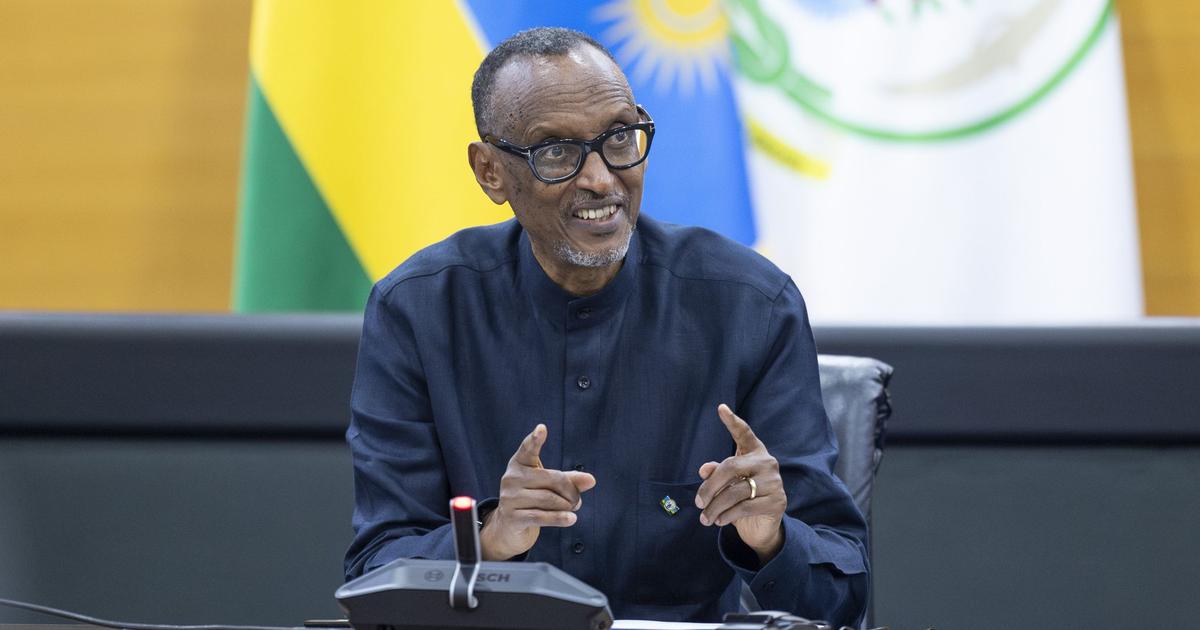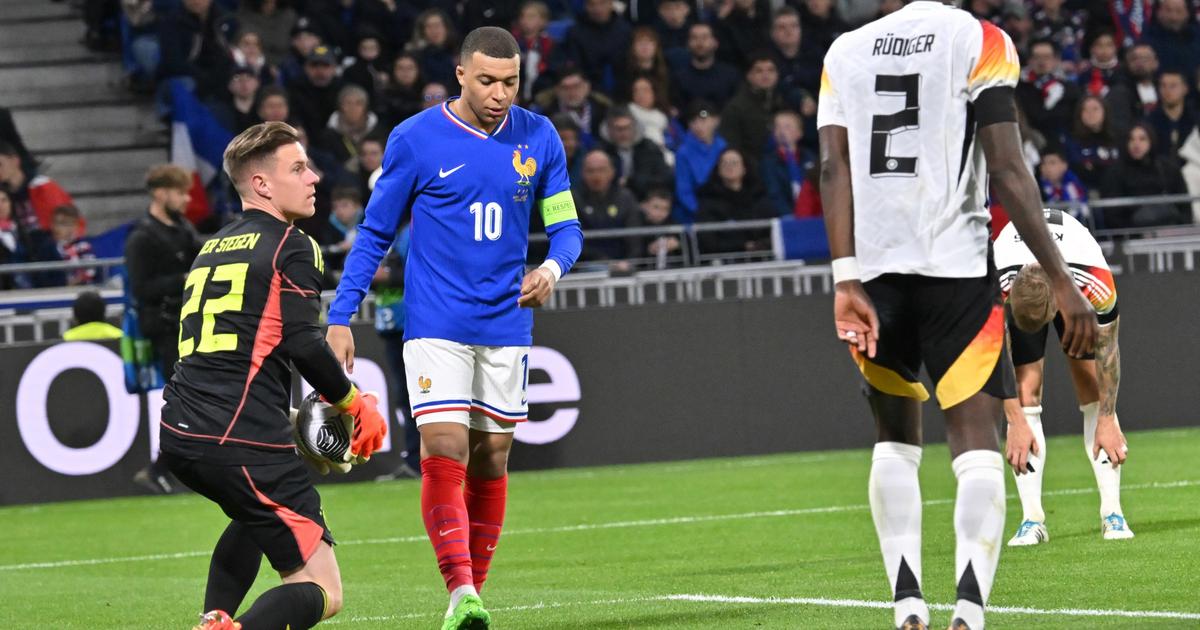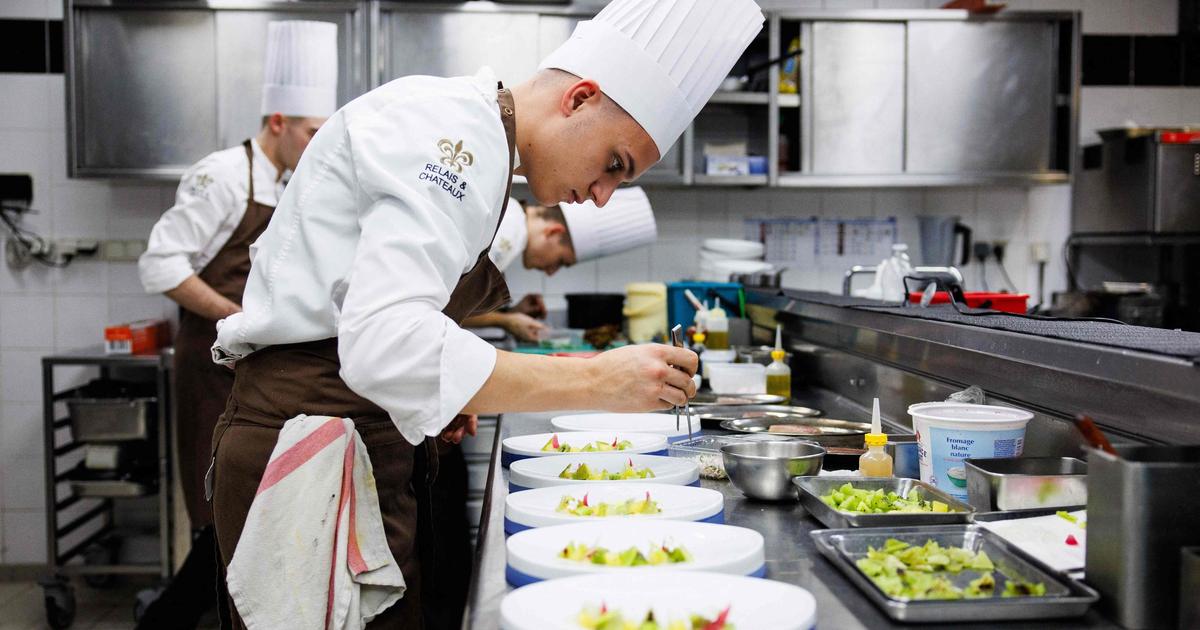Nolan Doudy is at the age when dreams of a career in football could actually come true.
"I want to become a professional," he says.
At the moment, however, he's doing all he can not to cry.
In the second half of the game, he limped off the field with a thigh injury.
And then, his team, the U-13 squad from Union Sportive Roissy-en-Brie, went on to lose against archrival Le Mée-sur-Seine 2:3.
He can hardly hold back his tears.
Although he is only 12 years old, Nolan has a football legacy to defend.
He plays center midfield, just like Paul Pogba did on this field.
This is where the French national team star was originally discovered back when he was Nolan's age.
The fact that his famous predecessor is also injured and is thus unable to take part in the World Cup in Qatar is of little consolation to Nolan.
"Anyway, my idol is Marcus Rashford from Manchester United."
The sadness on his face beneath his braided hair has given way to defiance as he pulls his winter coat on over his jersey.
Next to him is his father, Monsieur Doudy, who says apologetically: "Pogba isn't quite as popular as he once was. That thing with the extortion has cast a poor light on us here in Roissy."
Roissy-en-Brie is a banlieue, a suburb, located about 20 kilometers east of Paris.
It is a "dangerous place," as Pogba once said of the neighborhood where he grew up. And earlier this year, the Juventus player experienced just how right he had been with that assessment.
He was held captive for an entire night at the point of a gun and commanded to turn over 13 million euros.
The gang accused of being responsible, which includes Pogba's own brother, is from the La Renardière quarter, the "Fox's Den."
Paul Pogba's Hometown in Roissy-en-Brie
The quarter is made up of 15-story residential high-rises and a few shoebox apartment buildings.
Paul Pogba and his two brothers grew up in tower 13, with some of the members of the extortion group having lived in towers 3 and 4. The French government classifies the quarter as being "in need of assistance."
The green areas may look well maintained, but the poverty rate here is 40 percent.
La Renardière is almost exclusively an immigrant quarter, with virtually all residents having their roots in Africa.
Just like the Pogbas, who are originally from Guinea, and like most of the boys who play for Union Sportive, just five minutes down the road.
Those who live here are at the bottom of French society.
Even as the World Cup in Qatar has managed to produce its own fair share of raised eyebrows in the football world, the criminal case surrounding Paul Pogba's kidnapping shines the spotlight on a number of French taboos.
Many top French soccer professionals grew up in places like Roissy, and some of them continue to maintain childhood friendships that have veered into the criminal world.
In recent months, star striker Karim Benzema has joined Pogba in the headlines, having dropped his appeal against the initial verdict in an affair involving a childhood friend.
Aminata Diallo, a midfield star for the French women's national team until recently, was placed in pre-trial custody in September.
They are headline-grabbing cases, but nonetheless represent a small sample of a much larger problem: According to a well-placed, unnamed source speaking to the daily
Le Parisien
, there are hundreds of extortion victims like Pogba.
It's just that nobody dares to talk about it openly.
The crimes involve money and envy, violence and extortion, real friends and fake friends.
And they testify to a failed French society, one that is fond of celebrating freedom, equality and fraternity when the national team and its recruits from the banlieues are successful, but which does not fulfil promises in real life of equality and social advancement to the brothers , sisters and friends of the football stars.
In 1998, when France won the World Cup for the first time, politicians invoked the myth of Black-Blanc-Beur, Black-White-Arabic, and millions celebrated in the streets as if the ethnically diverse team surrounding global star Zinédine Zidane could heal social divides.
The Embodiment of France
Four years ago, when the Bleus won for the second time, there was again a glittering festival on the Champs-Élysées, at which French of all social strata celebrated their unity late into the night.
French President Emmanuel Macron eagerly surrounded himself with the World Cup heroes, and Paul Pogba filmed himself with the French head of state, exulting: "Long live France! Long live the Republic!"
Wearing the shirt of the Tricolore, the national team players from the banlieue embody France in its entirety.
But inside themselves, they carry the fissures that run through the country.
Players on the German national team come almost exclusively from middle-class backgrounds.
In France, by contrast, football is a sport for the societal periphery.
The "quartiers populaires," or "people's quarters" as the ghetto-like settlements are shame-facedly referred to, produce unending supplies of soccer talent, not unlike the favelas of Brazil.
Bondy, for example, a suburb of 55,000 located just northeast of Paris, is home to three players on the French World Cup team.
One-third of the banlieue's population lives below the poverty line.
Bondy is also one of the places in France where the most crimes are committed per capita.
"The French like watching soccer. Nevertheless, parents from the middle and upper classes don't sign their children up to play. People are afraid their children will be treated poorly," says Julien Bertrand, a sociologist at the University of Grenoble.
Bertrand has spent years conducting research into the development of the country's sporting elite.
"Higher income families prefer to choose sports for their children like swimming. Or sports they believe convey higher values, like judo, for example."
The French mainstream likes football, but they prefer to enjoy it from a safe social distance.
As a result, it is frequently the children of African immigrants who end up finding success in the multimillion-euro business of football.
"The rise that is denied to their friends is one they experience exponentially, in a certain sense," says Bertrand.
"It demands from them a difficult balancing act. On the one hand, they remain tied to the world into which they were born, but on the other, they are catapulted into a world characterized by completely different living standards and lifestyles."
This discrepancy has an effect back home in the precarious milieus from which they come.
It produces envy and leads to family and friends developing certain expectations, or even demands, of the football superstars.
"Frequently, money is demanded from them as a sign of solidarity. The players fear nothing so much as the accusation that they have forgotten where they come from," says Bertrand.
It can be a slippery slope, however, from those demands for solidarity to extortion.
The boundaries are permeable.
As was the case for Pogba.
Roissy's most famous son was generous to his hometown, with a football pitch emblazoned with his silhouette having recently been installed, among other things.
He also proved beneficial with regard to his former schoolmates, who are now under investigation.
Pogba picked up the tab for a number of luxurious vacations.
He hired his old friend Boubacar C., aka Boub's, as a private chauffeur for his mother, who once kept the family going for him and his brothers with cleaning jobs.
Citing investigation files, the French daily
Le Monde
has reported that during his stint with Manchester United, Pogba allowed a friend of his with a police record – Mamadou M., called Mam's – to live with him for an extended period.
Pogba is also thinking to have paid money to ensure that his less-skilled older brother Mathias could play for the lower league team Tours FC.
Pogba's kidnappers wanted 13 million euros
On March 19, 2022, Paul Pogba again returned to the Fox's Den to visit his old friends.
But this time, they weren't just holding out their hands.
They had different plans.
They guided their famous friend into a darkened apartment they had rented not far from Roissy.
Among the group was also a man named Roushdane K., who was reportedly involved in a hostage-taking incident in 2017, according to the French media.
In the Airbnb apartment, Pogba was forced to turn off his mobile phone, as he would later tell the police.
After a couple of hours, two masked men entered the room.
Holding rifles, they demanded 13 million euros: 3 million in cash and another 10 million by transfer to an account in Dubai.
The sum amounted to 1 million for each year of Pogba's professional career, money that the extortionists claimed he owed them for protection.
Early the next morning, they let him go.
The extortionists had in their possession a USB stick allegedly storing content they could use against Pogba: Proof that the player had apparently hired an African witch doctor to put a curse on Kylian Mbappé, his teammate on the French national side.
"I was scared," Pogba told the police.
Indeed, he initially intended to meet the demands of his kidnappers.
But when the gang was lying in wait for him in Turin in the summer, he decided to go to the authorities.
The case only became public, though, because his brother Mathias shared a video on social media in which he accused Paul of being a traitor.
A short time later, Mathias Pogba landed in pre-trial detention, along with the other suspects.
Mathias Pogba denies allegations from the investigators that he was involved in the "establishment of a criminal organization" and "organized extortion."
"Football and criminality come from the same place," says Frédéric Guerra, a player agent who has discovered a number of current top players, including Karim Benzema, the striker from Real Madrid.
Guerra is one of the few who dares discuss the taboo issue of French football.
He has players under contract who asked him to place them with a foreign team, he says.
"Not because they want to earn more money there, but because they want to escape their toxic group of acquaintances," Guerra says.
Players Are Ashamed of Their Success
"I have often seen young players who are friends with small-time gangsters."
The pattern is frequently the same, he says, with younger players initially only being sponged off for a couple thousand euros.
"With time, the sums become larger and the intimidation more threatening," Guerra says.
One of his clients, whose name he declines to provide, initially fed 10 people from his salary.
Later, Guerra says, it rose to 500 people, including an entire village in Africa.
Of the 25 million euros he says the player earned during his career, nothing is left.
"In a certain sense, the players are ashamed of their success. And they want to buy themselves out of this feeling," says Guerra.
"On the other hand, for many it has become normal to flaunt their wealth on social media. And that only adds fuel to the envy."
Karim Benzema, who, like Pogba, is sitting out this World Cup due to an injury, is fond of showing off his luxury car collection on Instagram.
But the son of Algerian immigrants also emphasizes his loyalty to Bron, a banlieue outside of Lyon.
In Bron, young Karim Benzema once lived in the same building as Karim Z. That friend entangled the football star in the so-called sex-tape affair in 2015. Benzema allowed himself to be drawn into a plot to extort a fellow national team player with a stolen private porn film.
For his role in the scandal, Benzema was sentenced to a year of probation.
In reading out the verdict, the judge emphasized Benzema's "unconditional friendship" to Karim Z.
But Benzema was lucky.
As long as he plays well, the French are more than happy to overlook such transgressions.
Indeed, even before his conviction was handed down, his temporary exclusion from the national team had been lifted.
This autumn, he was honored in France for receiving the Ballon d'Or, world football's top individual honor, and a huge mural of him was unveiled on the side of a building back in Bron.
Women players have also been accused of doing wrong.
National team player Aminato Diallo, who grew up in an immigrant quarter of Genoble, apparently couldn't come to terms with her club, Paris Saint-Germain (PSG), having brought in competition for her in midfield.
Investigators suspect her of luring team rival Kheira Hamraoui into an ambush in fall 2021. Hamraoui was beaten with metal rods wielded by masked men, who had apparently been told to shatter her kneecaps.
To hatch the plot, Diallo is thought to have used her contacts to a prison inmate and to gang members in the Paris region.
She denies the accusations.
French football has also been beset by other forms of crime - of the sort that is more at home in the distinguished salons of Paris.
The authorities, for example, are looking into whether the sale of PSG to Qatar might have been a reciprocal deal for France having supported the awarding of the World Cup to Qatar.
The president of the French Football Federation, Noël Le Graët, meanwhile, has been accused of numerous instances of sexual harassment against women employees, accusations which he has denied.
The players themselves, however, generally have one problem above all others: trying to bridge the social gap between their old lives and their new ones.
Trying to Escape
In Roissy-en-Brie, where the U-13 team plays, Nolan Doudy's father is standing on the sideline.
He yells at the referee: "Watch out that we don't light your house in Nigeria on fire!"
It was meant as a joke, one of those you can share between Africans.
He gave his son Nolan a paracetamol tablet for the pain in his thigh.
"It'll go away."
Monsieur Doudy believes that his son has what it takes to become a professional.
"But there is also something else in life," he says.
He is happy, he says, that Nolan is also a diligent student.
He refuses to be discouraged by the fact that France is particularly bad at helping children from disadvantaged swaths of society.
In the PISA educational assessment tests, the country is among those in which school achievement is primarily dependent on the education level of the student's parents.
For many a banlieue family, a son who shows a bit of talent on the pitch is their best chance at social advancement.
Nolan Doudy's family is trying to escape the banlieue.
They moved out of the problematic quarter as soon as an opportunity presented itself, and are now living in a town near Roissy.
Doing without football, to be sure, is not an option.
"But it is important to us," says Monsieur Daudy, "that the children grow up in a good area."
An area that won't continue to present a danger decades down the road.



/cloudfront-eu-central-1.images.arcpublishing.com/prisa/URTHM623RJCDZP75WCLHLWCFNI.jpg)





